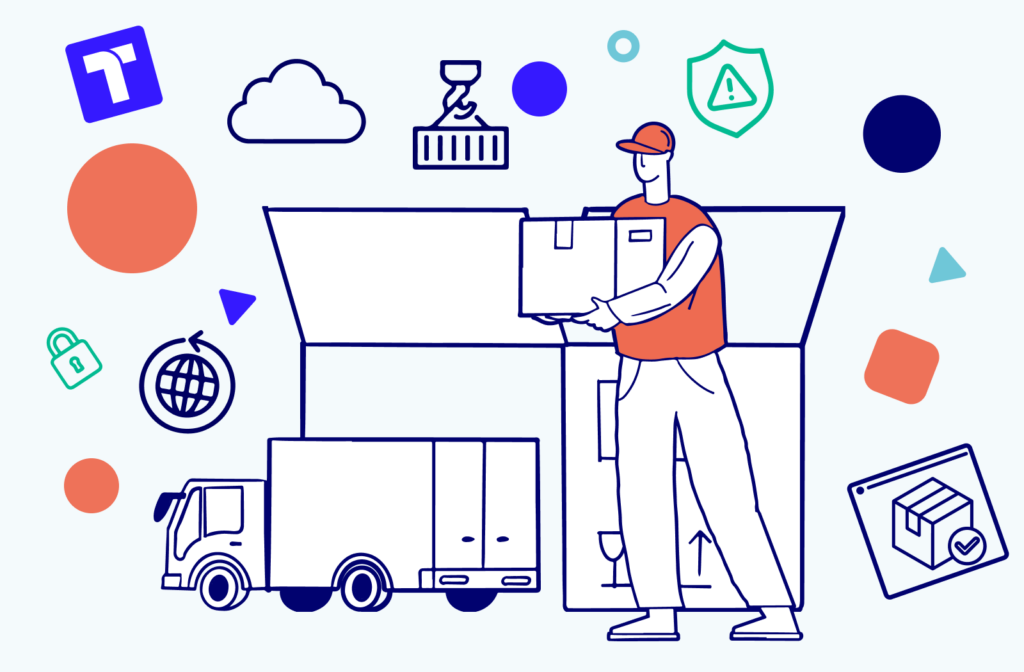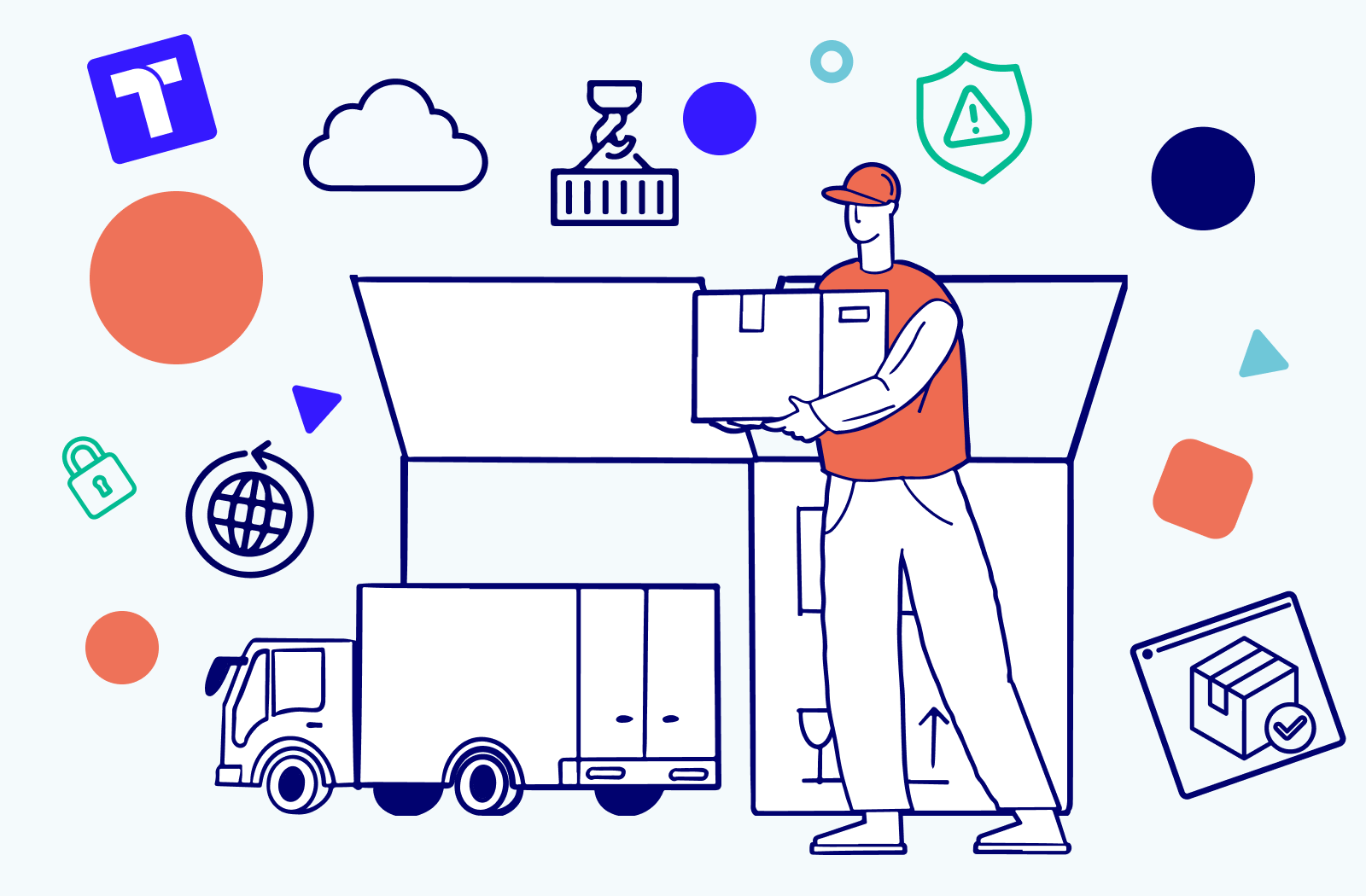
Packaging and containers are humble but essential staples in business, whether the end user is a consumer or another business. Shopaholic? An Amazon box. Hungry? Paper or plastic bags at the supermarket (if you don’t have your own reusable eco bag with you). Thirsty? Aluminium cans. Transporting steel coils? Runners, wedge cradle, outer/inner/side support, bands, plastic wrap. And so on. There’s a huge B2B industry behind this. And, B2B BNPL for packaging and container merchants and marketplaces can help the industry thrive.
6 packaging and container industry insights
Let’s look at six insights about the B2B packaging and container sector in Europe!
- Sustainability drives innovation
- Rise of smart packaging
- E-commerce packaging solutions
- Regulatory push for eco-friendly packaging
- Customisation and personalisation
- Impact of mega-trends
Sustainability drives innovation
European packaging companies are at the forefront of developing sustainable packaging and container solutions and helping move us toward a circular economy.
Seaweed isn’t just in ice cream anymore! It also helps to replace single-use plastics. Innovations include seaweed-coated cartons thanks to a partnership between Notpla and Coveris.
Have a beer! Barley is a key ingredient. But now, there’s even beer packaging made from barley straw thanks to AB InBev and Sustainable Fiber Technologies. We always thought beer would help the world.
Companies are also increasingly adopting paper-based solutions. Isn’t it probably about time to let traditional plastic die its long, long death? So, innovations like Paboco’s paper bottles – tested out by major brands such as Carlsberg – is a great examples of this shift.
Fibre isn’t just for your diet anymore! Innovations in fibre-based materials, like those developed by Ukrainian startup Releaf Paper using cellulose from fallen leaves, highlight the industry’s push towards biodegradable and renewable packaging alternatives.
Furthermore, Europe is leading in implementing circular economy principles in packaging. This involves designing packaging that is not only recyclable but also made from recycled materials. Such practices are becoming a key differentiator for businesses committed to sustainability.
Additionally, there’s a significant shift towards minimalistic packaging designs. Why? These reduce waste, improve user experience, and align well with modern aesthetic sensibilities.
Such advancements aim to reduce environmental impact and cater to the growing demand for sustainable eco-friendly packaging and container options. (sources: 1,2,3,5)
Rise of smart packaging
Smart packaging is revolutionising the industry by integrating technologies like IoT (the Internet of Things). What are some examples of this? This includes sensors to monitor temperature for perishable goods or medicines and QR codes that enhance customer interaction and supply chain visibility.
These packaging innovations are critical for industries like pharmaceuticals and food logistics. (source: 3)
E-commerce packaging solutions
With the surge in online shopping, packaging designed specifically for e-commerce has become essential. These solutions focus on durability and cost-efficiency to withstand the rigours of shipping while ensuring product protection.
This trend is driving the development of returnable and reusable packaging to support circular economy practices. The future is becoming now! (sources: 3,4)
Regulatory push for eco-friendly packaging
The EU’s updated Packaging and Packaging Waste Directive aims to make all packaging reusable or recyclable by 2030. Banning forever chemicals in packaging is also part of the plan. This regulatory framework is driving innovation and compliance across the industry, pushing companies to adopt more sustainable practices. (source: 2)
Customisation and personalisation
As B2B clients demand more tailored solutions, packaging companies are offering highly customised and branded packaging options. This trend enhances product value and strengthens customer relationships through unique and personalised packaging experiences. (source: 3)
Impact of mega-trends
Post-pandemic shifts have influenced the packaging industry significantly. Key trends include a focus on health and wellness, ease and affordability, and the importance of flexible and rigid plastics, which still dominate the market but are increasingly incorporating recycled content. (source: 5)
What picture are we painting with these insights? The B2B packaging and containers industry in Europe is evolving through innovation, sustainability, and responsiveness to regulatory and market demands.
B2B BNPL for packaging and container industry businesses
A B2B Buy Now, Pay Later (BNPL) solution like Terms.Tech offers substantial benefits to companies in the B2B packaging and containers industry.
Enhanced cash flow management
Improved liquidity
B2B packaging companies may face long payment cycles, which can strain cash flow. A BNPL solution allows businesses to defer payments for their purchases, improving liquidity and enabling them to invest in other critical areas like R&D or scaling operations. And, with Terms.Tech, those selling the packaging get paid upon delivery, thus lowering DSO considerably = sell now, cash now.
Flexibility in payments
By using payment terms to defer and/or spread out payments, companies can better manage their cash flow and avoid the financial strain of large, upfront expenditures. For example, Terms.Tech offers payment terms up to 120 days.
Increased purchasing power
Larger orders with deferred payments
BNPL solutions enable companies to make larger purchases without immediate capital outlay. This can be particularly beneficial for bulk buying or investing in more advanced, sustainable packaging solutions that might have higher initial costs.
Negotiation leverage
With the ability to pay over time, companies might negotiate better terms with suppliers, taking advantage of bulk discounts or more favourable pricing structures.
Growth and scalability
Supporting expansion
As businesses grow, so does their need for packaging materials. BNPL can support expansion efforts by allowing companies to increase their purchasing volume in line with their growth, without immediate financial constraints.
Entry into new markets
Flexible payment options can facilitate entry into new markets, enabling companies to secure the necessary packaging materials to support new product launches or market expansions without significant upfront costs. For example, Terms.Tech operates through the entire EEA plus Switzerland.
Inventory management and optimisation
Efficient stocks and inventory management
BNPL solutions enable companies to keep their inventory levels optimised without tying up too much capital. This is crucial for maintaining the balance between meeting demand and managing storage costs.
Buffer against supply chain disruptions
With deferred payments, companies can maintain a buffer stock to cushion against supply chain disruptions, ensuring that they can continue operations smoothly.
Customer relationship management
Strengthening supplier relationships
Offering flexible payment terms can improve relationships with suppliers, as businesses can assure timely payments without financial stress. This can lead to more favourable terms and ongoing support from suppliers.
Building trust with buyers
For companies selling packaging solutions, offering BNPL to their clients can make their products more attractive, facilitating easier purchasing decisions and building up long-term customer loyalty, the key to B2B success.
Competitive advantage
Differentiation
Offering BNPL can set a company apart from competitors by providing a more attractive financing option, potentially capturing a larger share of the market.
Attracting new clients
Flexible payment solutions can attract new clients who might have been hesitant to commit to significant upfront costs, thereby expanding the customer base.
Adapting to market trends
Supporting e-commerce growth
As the e-commerce sector grows, packaging companies can meet the increased demand without immediate financial pressure, aligning their capabilities with market trends.
Sustainable investment
Many companies are transitioning to sustainable packaging solutions, which can be more costly. BNPL allows them to invest in these greener options over time. That way they can align with both sustainability and cash flow goals.
Streamlined financial operations
Simplified payment processes
BNPL solutions often come with integrated financial management tools that simplify the tracking and managing of payments, invoices, and receivables.
Risk management
Many BNPL providers offer risk management services that include credit assessments and fraud protection. Terms.Tech reduces your financial risk and saves you time by taking on the onus of running the credit and risk assessment on your customers.
Boosting packaging and container innovation
Investing in new technologies
Access to BNPL can facilitate investment in new packaging technologies and innovations without immediate financial burden, allowing companies to stay ahead in a competitive market.
R&D funding
With deferred payments, businesses can allocate more resources to research and development. This fosters continuous improvement and innovation in their packaging solutions. Let’s not get left behind!
Improving operational efficiency
Automated payment solutions
Many BNPL platforms integrate with existing financial systems, automating payment schedules and reducing administrative burdens, allowing companies to focus on core operations. Say ‘Good-bye’ to the days of manual drudgery!
By leveraging a B2B BNPL solution like Terms.Tech, companies in the packaging and container industry can navigate financial challenges, enhance their operational capabilities, and strategically position themselves for growth and sustainability.
Any questions about the benefits described above? Contact Terms.Tech to learn more about how our B2B BNPL payment terms service can help your company.
Sources
1 – Packaging Europe
4 – GWP Group



